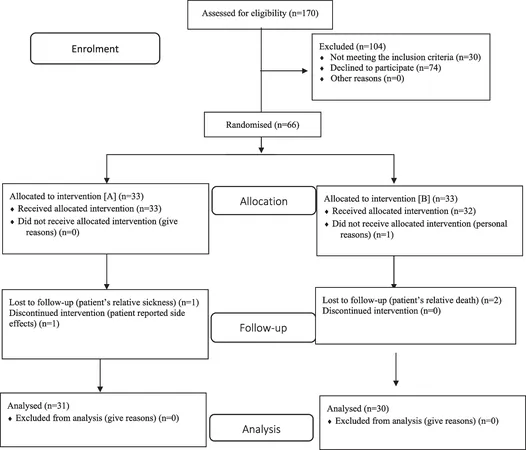
Unveiling the Potential of Symbiotic Supplements in Managing Type 2 Diabetes: A Groundbreaking Study in Baghdad
2024-12-28
Author: Li
Introduction
Type 2 diabetes mellitus (T2DM) is a growing global health concern, affecting approximately 537 million adults worldwide, with Iraq being among the countries facing a significant diabetes epidemic. A recent study conducted in Baghdad aimed to explore the potential benefits of symbiotic supplements—combinations of probiotics and prebiotics—in managing various health parameters associated with T2DM.
The Study: Methodology and Objectives
This double-blind, placebo-controlled clinical trial involved 66 participants aged between 30 and 75 years, who were randomly assigned to receive either symbiotic capsules containing 200 million colony-forming units (CFUs) plus fructo-oligosaccharides or a placebo for a duration of 12 weeks. The main objective was to observe any changes in glycated hemoglobin (HbA1c), a key marker for managing diabetes, along with anthropometric measures (such as body mass index and waist circumference), and lipid profiles including high-density lipoprotein (HDL) and low-density lipoprotein (LDL).
Exciting Results: How Symbiotics Impact Health
The results of the study were promising, showcasing significant reductions in body mass index (BMI) and waist circumference in the symbiotic group, alongside an increase in HDL cholesterol levels. Specifically, BMI decreased significantly (P = 0.005) as did waist circumference (P = 0.023). While HbA1c levels increased in the placebo group (P = 0.016), they remained stable in the symbiotic group.
Moreover, fasting blood sugar (FBS) levels were significantly lower in the group taking symbiotics compared to those on placebo (P = 0.02). However, notable changes in total cholesterol, LDL, and triglycerides were not observed.
The Science Behind the Findings
The underlying hypothesis suggests that symbiotics may positively influence the gut microbiota, which plays a crucial role in metabolic functions. Previous studies have shown that the gut microbiome can significantly affect insulin sensitivity and glucose metabolism—key factors in diabetes management. By modulating these gut bacteria, symbiotics could have a beneficial effect on blood sugar control and overall health outcomes.
Research has indicated that dietary fibers can also enhance gut microflora, leading to increased production of short-chain fatty acids that may contribute to improved insulin resistance and metabolic regulation.
The Bigger Picture: Diabetes in Iraq
Iraq is facing a diabetes crisis, with one in six adults affected. With the growing prevalence of T2DM, innovative strategies such as symbiotic supplementation could pave the way for more effective management of the disease. As healthcare systems grapple with the rising burden of diabetes, it is crucial to explore and integrate new treatment modalities.
Conclusion: A Step Towards Better Diabetes Control
The findings of this study advocate for further investigation into symbiotics as a viable therapeutic option for T2DM management. While preliminary results show promise in improving key metabolic indicators, larger trials are necessary to validate these findings and establish conclusive evidence.
As researchers continue to unveil the complexities of diabetes management, integrating dietary interventions like symbiotics could revolutionize treatment approaches, ultimately helping patients achieve better health outcomes.
Stay tuned as we continue to monitor developments in diabetes research and uncover strategies that may change lives!




 Brasil (PT)
Brasil (PT)
 Canada (EN)
Canada (EN)
 Chile (ES)
Chile (ES)
 Česko (CS)
Česko (CS)
 대한민국 (KO)
대한민국 (KO)
 España (ES)
España (ES)
 France (FR)
France (FR)
 Hong Kong (EN)
Hong Kong (EN)
 Italia (IT)
Italia (IT)
 日本 (JA)
日本 (JA)
 Magyarország (HU)
Magyarország (HU)
 Norge (NO)
Norge (NO)
 Polska (PL)
Polska (PL)
 Schweiz (DE)
Schweiz (DE)
 Singapore (EN)
Singapore (EN)
 Sverige (SV)
Sverige (SV)
 Suomi (FI)
Suomi (FI)
 Türkiye (TR)
Türkiye (TR)
 الإمارات العربية المتحدة (AR)
الإمارات العربية المتحدة (AR)